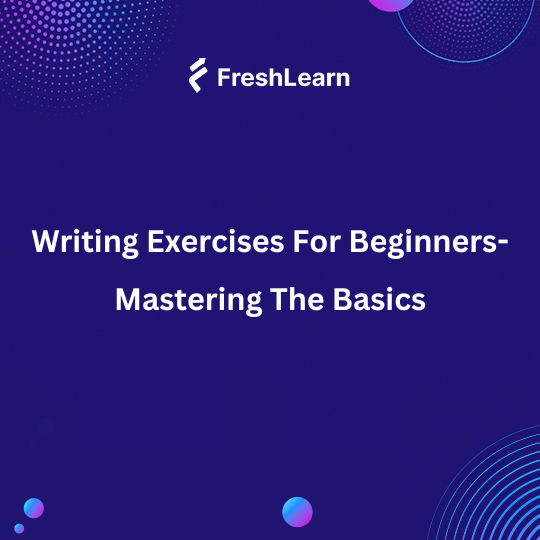
Writing Exercises For Beginners- Mastering The Basics
Hey there! Ever thought about starting a blog and felt a bit lost about where to start? No worries, we've all been there!
Our blog is aimed at teaching newbies like you how to write enjoyable and useful blog posts. We have some cool exercises to help you improve your writing skills, get your creative juices flowing, and discover your own distinct voice.
Stuck in a writing rut or simply want to improve your skills? We have a ton of advice to share, so come on in!
Why Writing Exercises Are A Creator's Secret Weapon?
Imagine this: you've poured your heart and soul into creating something amazing - a product, a course, a blog post. But when it comes time to share it with the world, your message falls flat.
Why? Clear, compelling writing is the bridge between your creation and a captivated audience.
Here's the secret weapon creators often underestimate: consistent beginner writing exercises. They're not just about grammar drills; they're about honing your ability to connect, persuade, and ultimately, achieve results.
Think of it this way: As a creative writer, every interaction you have with your audience involves writing, from crafting captivating headlines that draw clicks to crafting email sequences that nurture leads into loyal fans.
- Land visitors on your landing page: Engaging descriptions and clear calls to action make the difference between a curious visitor and a paying customer. Various quick writing exercises for beginners help you refine this art of conversion.
- Turn website browsers into subscribers: Compelling opt-in forms with enticing headlines and descriptions are the gateway to building your community. Writing exercises equip you to craft these magnets that attract the right people.
- Keep your audience glued to your newsletter: Whether it's a free or paid subscription, strong writing is what keeps them coming back for more. Exercises help you develop your voice, tell captivating stories, and deliver valuable information in a way that resonates.
- Craft digital products that sell: From ebooks to online courses, the power of clear, concise writing is undeniable. Exercises help you translate complex ideas into easily digestible content that informs and inspires.
- Fuel your social media presence: Even a witty tweet requires strong writing skills. Exercises help you refine your voice and craft engaging posts that cut through the noise.
Best Writing Exercises For Beginners
Writing exercises can be a fun way for beginners to explore their creativity and develop their skills. Here are a few creative writing exercises for beginners:
Pre-Writing Exercises for Beginners
1. Finding Your Niche
Before you start writing, consider what you're passionate about. Here are some writing prompts to spark your focus:
- Firstly, Brainstorm your interests and make a list of things you love to do, hobbies you have, or topics you find endlessly fascinating.
- Secondly, define your target Audience- Who do you imagine reading your work? Are they history buffs, dog lovers, or tech enthusiasts? Understanding your audience helps tailor your writing.
- Finally, take time to research your niches. Explore popular blog topics to see what resonates with you. This doesn't mean copying others, but it can give you a sense of current trends.
2. Developing Blog Ideas
Sometimes, inspiration hides in plain sight. Try these prompts to unearth hidden gems:
- Everyday Experiences: Take a moment to reflect on your daily writing routine. Can you turn a trip to the grocery store, a conversation with a friend, or a funny observation into a compelling blog post?
- Current Events and Trends: Are there any news stories or social media trends that pique your interest? Offer your unique perspective on these topics.
- Finding Inspiration from Others: Read other blogs (but avoid copying their specific ideas!). Notice what topics grab your attention and how they're presented.
3. Creating Catchy Titles
A strong title is like a shop window for your writing. Here's how to craft titles that grab attention:
- Importance of Titles: A captivating title can make or break whether someone clicks on your work.
- Brainstorming Techniques: Play with words! Use alliteration (like "Powerful Productivity Tips"), wordplay ("The Write Way to Write"), or numbers ("5 Signs You Need a Writing Break").
Remember, these are just starting points. The most important thing is to have fun and explore what ignites your writing passion!
6 Writing Exercises For Beginners
1. 5-Minute Freewrite
Freewriting is a practice where you set a timer for a short period, usually five minutes, and write continuously without worrying about grammar, structure, or coherence. It's about letting your thoughts flow freely onto the blank page.
Free writing exercises for adults help writers overcome writer's block, tap into creativity, and discover new ideas. By bypassing your inner critic, you can access deeper thoughts and emotions. Plus, it's a great warm-up before diving into more structured writing tasks.
As for blogging prompts, consider topics like "The Ideal Blog Post," where you explore what elements make a blog post engaging and informative. Or delve into "My Dream Blog Niche," where you envision the perfect subject matter that aligns with your passions and expertise.
2. Descriptive Writing
Vivid descriptions are the lifeblood of compelling blog posts. They transport readers to different worlds, evoke emotions, and make the mundane extraordinary.
A well-crafted description can transform a simple observation into a captivating narrative. Whether you're describing a place, object, or experience, painting a vivid picture with words is key to keeping readers hooked.
To start off with a creative writing exercise think about your favorite place: maybe a cozy cafe tucked away in a bustling city. Describe the warm glow of sunlight coming in through the window, the peaceful murmur of conversation broken by the clinking of cups, and the aroma of freshly prepared coffee mingled with pastries.
You may give your readers the impression that they are in the room with you by using sensory elements.
3. Storytelling Exercise
Storytelling is an effective strategy for engaging readers. It allows you to interact with your audience in a more personal way, making your message more relevant and memorable. A well-told story captivates the audience, creates suspense, and leaves a lasting impact.
This exercise is really effective for fiction writers. For this exercise, share a personal anecdote that follows a clear narrative arc: a beginning that sets the scene and introduces the main characters or situation, a middle where tension or conflict arises, and an end where resolution or reflection occurs.
It might be an amusing childhood memory, a sweet encounter with a loved one, or a lesson gained from a difficult situation. Whatever the tale is, focus on telling it in a way that attracts readers in and keeps them engaged until the end.
4. Character Development
Developing well-rounded characters is essential for entertaining storytelling. Creating a character profile sheet is a good beginner's exercise. This document should include information about your character's name, age, looks, occupation, hobbies, fears, and objectives.
Once you've created a character profile, you can go deeper by writing a brief scene about your character. Introduce an issue or conflict for them to encounter and observe how they respond to it.
Consider how their personality qualities influence their choices and actions in this situation. This activity helps you develop your character and learn how their characteristics influence their actions in your story.
To further develop your character, experiment with different backgrounds and life experiences. How might a character's upbringing or past experiences influence their worldview?
By exploring these factors, you can create more complex and believable characters that resonate with your readers.
5. Experiment with Point of View
Point of view (POV) is another essential element of storytelling that beginners can explore through writing exercises. One effective exercise is to rewrite a scene from a book or movie from a different character's perspective.
Consider how the events of the scene might be perceived differently by various characters and how their unique viewpoints shape their interpretation of the situation.
Also, try writing the same scene in both first and third-person perspectives. Consider how the narrative voice switches between the two perspectives, and how each affects the reader's experience with the story.
This exercise is the best way to practice several narrative methods while also teaching you about the benefits and drawbacks of each point of view.
6. Flash Fiction
Flash fiction is a form of short fiction characterized by its brevity and focus on concise storytelling. Beginners can practice writing by setting a timer for 10-15 minutes and writing a complete story within that time frame.
The constraint of a time limit encourages you to focus on essential elements of storytelling and hone your ability to convey emotions and atmosphere in a limited space.
Another approach to flash fiction is to start with a single-sentence writing prompt and build a story around it.
This exercise challenges you to think creatively and develop a narrative from a simple idea, fostering innovation and imagination in your writing.
Wrapping Up
In other words, writing exercises for beginners are like gold. They're like a writer's Bootcamp, teaching you the ropes of grammar and vocabulary, but in a way that lets you flex your creative muscles. It's like learning scales on the piano before you write a symphony!
The cool thing is, that these exercises are your playground. You can try different writing styles, craft stories that transport readers to new worlds, or just write in a journal to find your own unique voice.
The more you write, the smoother your words will flow. These days, it's more about expressing yourself and perhaps even learning something new about yourself than it is about reports and emails.
So, are you writing a poem, a short fiction, or just writing in your notebook to decompress? Continue! There's always more to discover and learn about writing, which makes it a lifetime journey.



